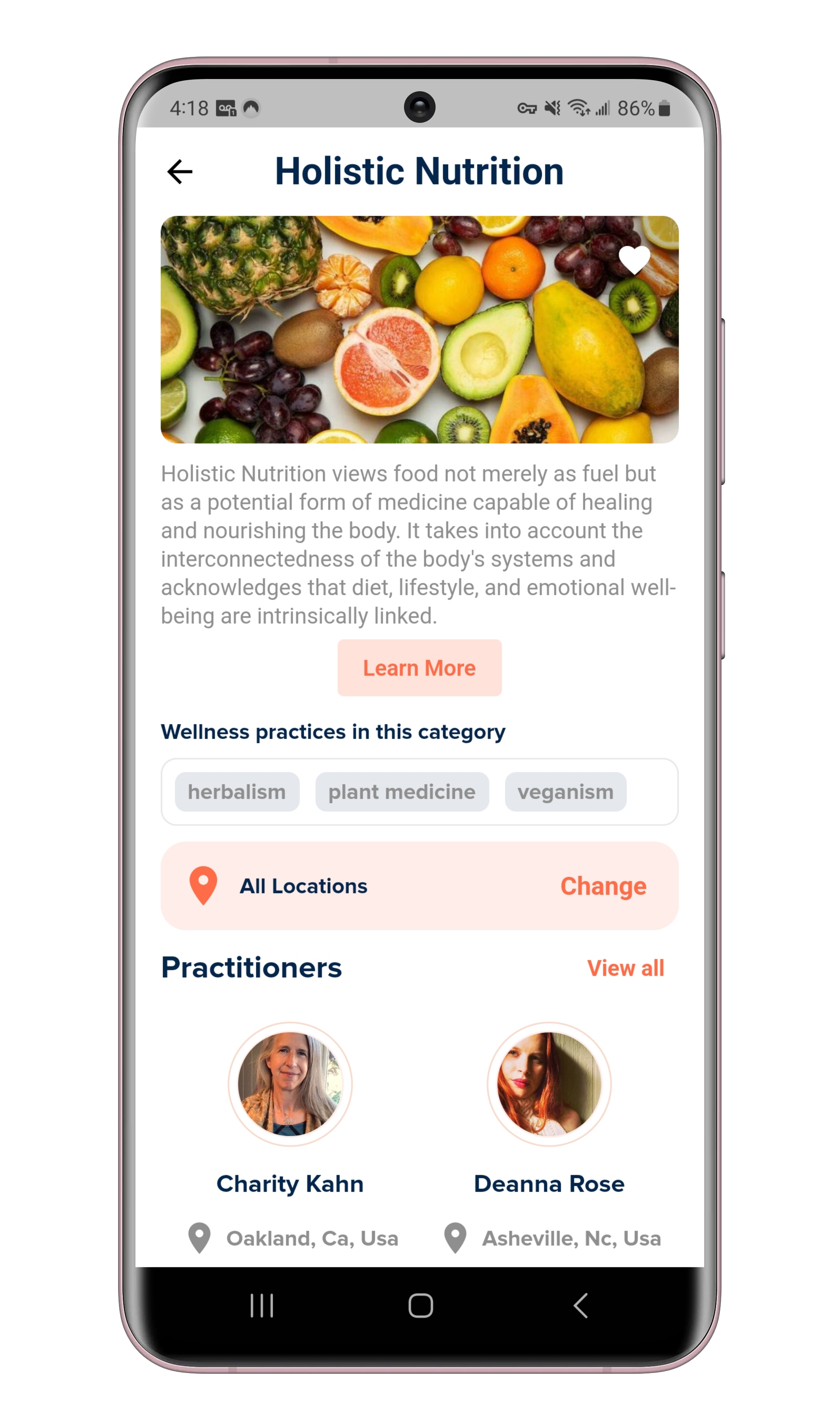Holistic Nutrition
Holistic Nutrition views food not merely as fuel but as a potential form of medicine capable of healing and nourishing the body. It takes into account the interconnectedness of the body's systems and acknowledges that diet, lifestyle, and emotional well-being are intrinsically linked.
Healers & Teachers connects you with Holistic Nutrition practitioners in just a few taps
Choosing to explore the path of holistic nutrition is a significant step towards improved well-being. Make your journey smoother and more enjoyable with Healers & Teachers app
Different Types of Holistic Nutrition Practices
The premise of Holistic Nutrition rests upon the recognition that our food choices not only impact our physical health but also have profound implications for our mental and emotional well-being, and even our spiritual growth. Holistic Nutrition strives to promote health through natural, whole foods, and a balanced lifestyle, recognizing that each person's nutritional requirements are unique. Holistic Nutrition incorporates various practices, each focusing on different aspects of health and wellness. These include:
Personalized Nutrition Plans: In holistic nutrition, personalized nutrition plans take into account an individual's unique health status, lifestyle, goals, and even preferences. These plans might recommend certain types of food, meal timings, portion sizes, and the combination of food groups to provide a balanced nutritional profile. It's not just about eating the right food but also about enjoying the food you eat, making sustainable choices, and considering how the timing of meals may impact your health and well-being.
Dietary Therapy: Dietary therapy involves manipulating the diet to support health and wellness. It might include specific nutritional protocols to manage or prevent chronic diseases like diabetes or heart disease, promote weight management, improve digestion, or enhance energy levels. Examples of dietary therapy could include a diet high in anti-inflammatory foods to manage inflammation, or a low-FODMAP diet to support individuals with irritable bowel syndrome.
Detoxification: Detoxification in holistic nutrition typically involves dietary and lifestyle practices that support the body's natural detoxification processes. This could involve consuming certain foods known to support liver health, increasing hydration, or even specific protocols like juice fasts. It's important to note that any detoxification practices should be undertaken with professional guidance..
Mind-Body Techniques: These techniques recognize the significant impact our mental and emotional state can have on our physical health, and vice versa. For instance, stress management techniques could help prevent stress-related overeating, while practices like mindful eating can help improve the enjoyment and digestion of our meals.
Holistic Nutrition and its Associated Practices
Holistic Nutrition is often associated with practices such as herbalism, veganism, and herbal medicine. These practices emphasize natural, plant-based nutrition and healing, further reinforcing the holistic approach to wellness.
Herbalism: Herbalism involves using plants and herbs for their medicinal properties. This could mean including specific herbs in the diet for their health benefits, like turmeric for its anti-inflammatory properties, or using herbal preparations like teas or tinctures for specific health concerns.
Veganism: Veganism is a diet and lifestyle choice that eliminates all animal products, focusing instead on plant-based foods. A vegan diet, when well-planned, can provide all the necessary nutrients for health. Veganism can also align with ethical and environmental values, making it a holistic choice for many people.
Herbal Medicine: Herbal medicine, much like herbalism, uses plants and herbs for their healing properties. However, herbal medicine often takes a more therapeutic approach, using concentrated herbal preparations to manage or prevent health concerns under the guidance of a trained herbalist or other health professional.
In all these practices, it's important to remember that while they can support health and wellness, they should be personalized to the individual's needs, and any significant dietary changes or health protocols should be done under the guidance of a trained professional.
Holistic Nutrition in Modern Daily Life
Holistic nutrition is an approach to health that can be adopted by anyone, regardless of their current state of health or wellness. It is particularly beneficial for those seeking to improve their overall well-being or address specific health concerns. Here are some signs that holistic nutrition may be a beneficial wellness practice for you:
Physical Indicators:
Chronic Health Concerns: If you're dealing with ongoing health issues like diabetes, heart disease, obesity, digestive problems, hormonal imbalances, or autoimmune conditions, holistic nutrition can help manage these conditions and improve overall health.
Fatigue and Low Energy: If you often feel tired, sluggish, or have difficulty getting through the day, it may indicate that your body isn't getting the right nutrients it needs to function optimally.
Poor Sleep: Difficulty falling asleep, staying asleep, or waking up feeling unrefreshed can be indicators of imbalanced nutrition. Certain dietary adjustments can improve sleep quality.
Mental and Emotional Indicators:
Mental Health Issues: Mood disorders such as depression and anxiety can be influenced by your diet. A holistic nutrition approach can help manage these issues and promote better mental health.
Stress and Burnout: If you're feeling overwhelmed, stressed, or on the brink of burnout, it may be a sign that your body and mind are not receiving the nutrients they need to cope effectively with stress.
Spiritual Indicators:
Seeking Connection: If you're looking to develop a deeper connection with your food, where it comes from, and how it impacts your body, holistic nutrition can foster this connection.
Desire for Wholeness: If you have a desire for overall wellness that encompasses not just physical health but also mental, emotional, and spiritual well-being, holistic nutrition aligns with this intention.
It's important to remember that holistic nutrition is not a quick fix but a lifestyle change. It requires time, patience, and commitment, but the rewards are significant—improved health, greater energy, better mood, deeper connection with food, and enhanced overall well-being. If you decide to explore holistic nutrition, consider consulting with a professional who can guide you through this process and ensure your approach is tailored to your unique needs and goals.
Healing and Growth begins with you
Remember, the journey towards holistic health and wellness is a personal one, and it can be comforting and reassuring to know you're not alone. With the Healers & Teachers app, you'll have a wealth of resources and a supportive community right at your fingertips, ready to assist you every step of the way.
The Healers & Teachers app offers:
Access to diverse practitioners specializing in various aspects of holistic nutrition, who can provide personalized guidance tailored to your unique needs and goals.
A broad spectrum of offerings, including one-on-one consultations, group classes, workshops, and specific holistic nutrition services, along with educational events and webinars.
A nurturing and supportive community where you can connect with others on a similar journey, share experiences, ask questions, and learn from collective wisdom.








